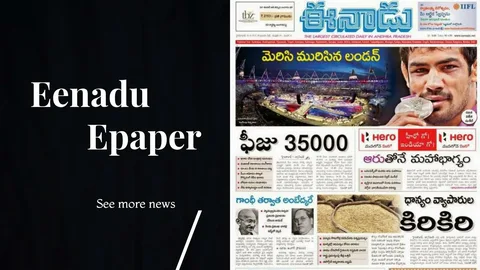Introduction In the fast-paced digital world where attention spans are shrinking and reading is increasingly replaced by scrolling, the Eenadu Sunday
Introduction
In the fast-paced digital world where attention spans are shrinking and reading is increasingly replaced by scrolling, the Eenadu Sunday Book remains a rare sanctuary for lovers of language, storytelling, and cultural discourse. A beloved supplement to the Eenadu newspaper, this weekly feature offers more than just stories or puzzles—it captures the pulse of Telugu society, intellect, and emotion.
For decades, the Sunday Book has reflected the evolution of Telugu language, literature, and lifestyle, making it one of the most cherished and enduring features of Telugu journalism. Let’s explore how this publication continues to educate, entertain, and enlighten its readers every week.
The Genesis of the Eenadu Sunday Book
The Eenadu Sunday Book emerged as part of a broader editorial vision of the Eenadu Group, a media powerhouse founded by Ramoji Rao in 1974. As the newspaper quickly became a household name across the Telugu-speaking states, the idea of a weekend feature arose to give readers a break from politics, economics, and hard news.
The Sunday edition started as a literary supplement, catering to families and individuals looking for in-depth, relaxing content for their leisure hours. Over time, this simple idea turned into a deeply engaging, culturally rich, and widely read part of Telugu print media.
What Makes the Sunday Book Unique?
Unlike daily news sections that focus on immediacy, the Sunday Book prioritizes depth, creativity, and cultural continuity. Here’s a breakdown of what sets it apart:
1. Rich Literary Tradition
- Every week, the Book features original short stories by talented Telugu writers. These range from heartwarming tales to dramatic pieces, often exploring themes like family, identity, values, and societal change.
- Poetry is also regularly featured, both modern and classical, bringing lyrical beauty to the reader’s weekend.
2. Cultural Reflection
- Essays often explore folklore, regional traditions, festivals, and arts, acting as a bridge between the past and the present.
- Articles on classical dance forms like Kuchipudi, or musical genres like Carnatic music, provide cultural context and education to young readers unfamiliar with these roots.
3. Educational Content
- In recent years, the Sunday Book has introduced case-based learning and essay-style content aimed at students preparing for competitive exams.
- This includes science explainers, career advice, and critical thinking prompts tailored for teenagers and young adults.
4. Engaging Puzzles and Games
- From crosswords and riddles to word searches and Sudoku, the puzzle section has become a family favorite, encouraging mental agility and fun.
5. Visual Appeal
- The Book is designed with attractive layouts, illustrations, and clear typography, making it both visually engaging and easy to navigate for all age groups.
Impact on Telugu Literature and Language
The Eenadu Sunday Book is not just a reader’s delight—it’s a cradle for modern Telugu writers.
- Many authors who are now established names started by publishing their first short stories in the Sunday Book.
- The platform actively encourages new voices, providing space to regional dialects, rural narratives, and experimental storytelling.
By doing this, the Book has preserved the purity and evolution of the Telugu language, helping it adapt while staying rooted in its core.
A Weekly Ritual for Families
In thousands of Telugu homes, the arrival of the Sunday paper is more than a news update—it’s a ritual. The Sunday Book is passed from elders reading essays, to parents solving puzzles, to children enjoying cartoons and short fiction.
It becomes a shared space for intergenerational learning and entertainment, something that few modern media platforms can claim today. For many, it’s also a sentimental part of their childhood—something they remember fondly even after moving abroad or shifting to digital media.

Reinventing for the Digital Age
Recognizing the changing media landscape, Eenadu has ensured the Sunday Book is not left behind. Now, readers can access it through:
- E-paper platforms on mobile and desktop
- Eenadu’s official apps
- PDF downloads for offline reading
This digital presence has allowed the Book to reach Telugu-speaking diaspora across the globe—from the U.S. to Australia—maintaining its cultural relevance in new geographies.
Yet, despite the availability online, the print edition retains a charm that many readers still prefer, especially the older generation.
Voice of the People: Letters and Reader Submissions
One of the most compelling aspects of the Sunday Book is its reader feedback column.
- People write in to comment on articles, offer their own insights, or respond to short stories with their personal experiences.
- Occasionally, the Book publishes reader-contributed poems and essays, fostering a two-way dialogue that enriches the publication and builds a tight-knit reading community.
This inclusive editorial approach has made the Sunday Book a people’s platform, not just a publication.
A Platform for Social Awareness
Beyond entertainment and literature, the Sunday Book has played a key role in promoting social awareness. Past editions have featured:
- Health and wellness columns
- Women empowerment stories
- Features on rural development and environmental issues
These articles are written in a non-preachy, narrative-driven style, making them accessible and impactful for a broad readership.
Challenges in the Modern Era
Despite its strengths, the Sunday Book faces a few challenges:
- Youth Engagement: Younger readers often gravitate toward quick digital content, social media, or video-based platforms.
- Limited Interactivity: The print version, by design, lacks the interactive elements of digital content.
- Language Attrition: As more youth shift toward English-based education and media, maintaining strong Telugu literacy becomes harder.
However, the editorial team has taken active steps to update the content, introduce modern themes, and enhance visual presentation to keep the Book engaging.
Why It Still Matters
In a media ecosystem dominated by speed, clickbait, and sensationalism, the Eenadu Sunday Book stands for:
- Quality over quantity
- Reflection over reaction
- Cultural depth over superficial content
It is one of the few surviving forms of slow journalism—a genre that encourages thought, engagement, and emotional connection with readers.
Looking Ahead
The future of the Eenadu Sunday Book is full of possibilities. Here are a few directions it could explore:
- Interactive digital editions with audio stories or embedded interviews.
- Writing competitions and workshops for young writers.
- QR codes in print versions that link to additional online content.
- Collaborations with schools to use the Book’s educational essays as learning resources.
If it continues to evolve while holding on to its core values, the Sunday Book can become even more influential in the coming decades.
FAQs
- What is the Eenadu Sunday Book?
It is a weekly literary and cultural supplement published every Sunday with the Eenadu newspaper. It features stories, poems, essays, puzzles, and educational content. - Who is the target audience?
The Book is designed for all age groups—children, students, adults, and senior citizens. It especially appeals to those who enjoy reading in Telugu. - Is the Sunday Book available online?
Yes, you can read it on Eenadu’s e-paper platforms, mobile apps, or download PDF versions for offline access. - Can readers submit content?
Yes, the Book occasionally invites reader contributions such as short stories, poems, and feedback letters. - How is it different from other supplements?
It focuses on original, in-depth, and culturally relevant content, rather than lifestyle trends or celebrity gossip. - What is its educational value?
Many of the essays and features are designed to enhance critical thinking, reading comprehension, and general knowledge—helpful for students and aspirants of competitive exams. - Does it support new writers?
Yes, it actively promotes emerging voices in Telugu literature by publishing their work and giving them a platform. - Why do people still prefer the print version?
The physical feel, layout design, and ease of reading without digital distractions make the print edition a favorite among loyal readers. - Is it only for readers in Andhra Pradesh and Telangana?
No. Thanks to digital platforms, readers across India and the world can access the Sunday Book. - What makes the Sunday Book culturally important?
It preserves and promotes the richness of Telugu language, arts, and thought, making it a key part of the region’s literary ecosystem.
Final Thoughts
In a world of fleeting headlines and fast news, the Eenadu Sunday Book offers something rare and enduring—a weekly space for deep thought, beautiful language, and cultural connection. Whether you’re reading it with your morning coffee, solving puzzles with your kids, or diving into a nostalgic short story, the Book remains a companion that speaks to the soul of Telugu life.
It isn’t just part of the weekend—it’s part of who we are.
More Info: primereport




COMMENTS